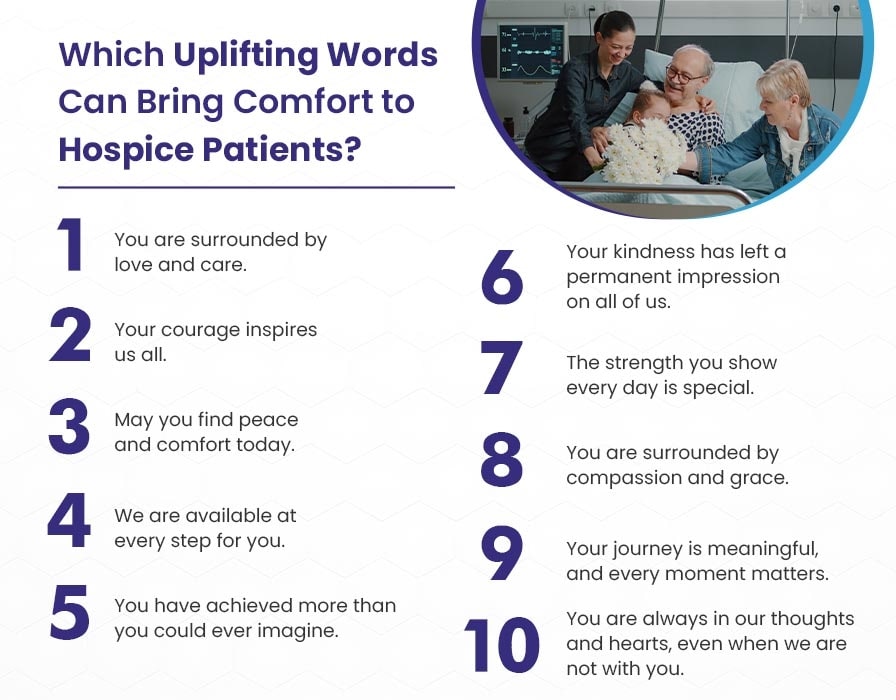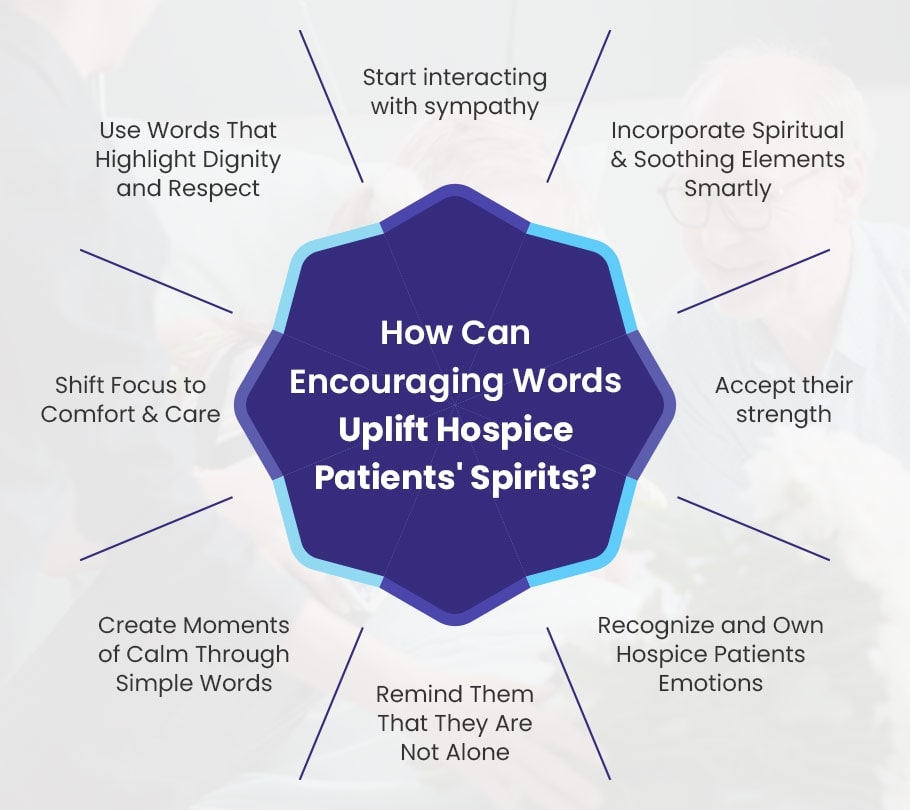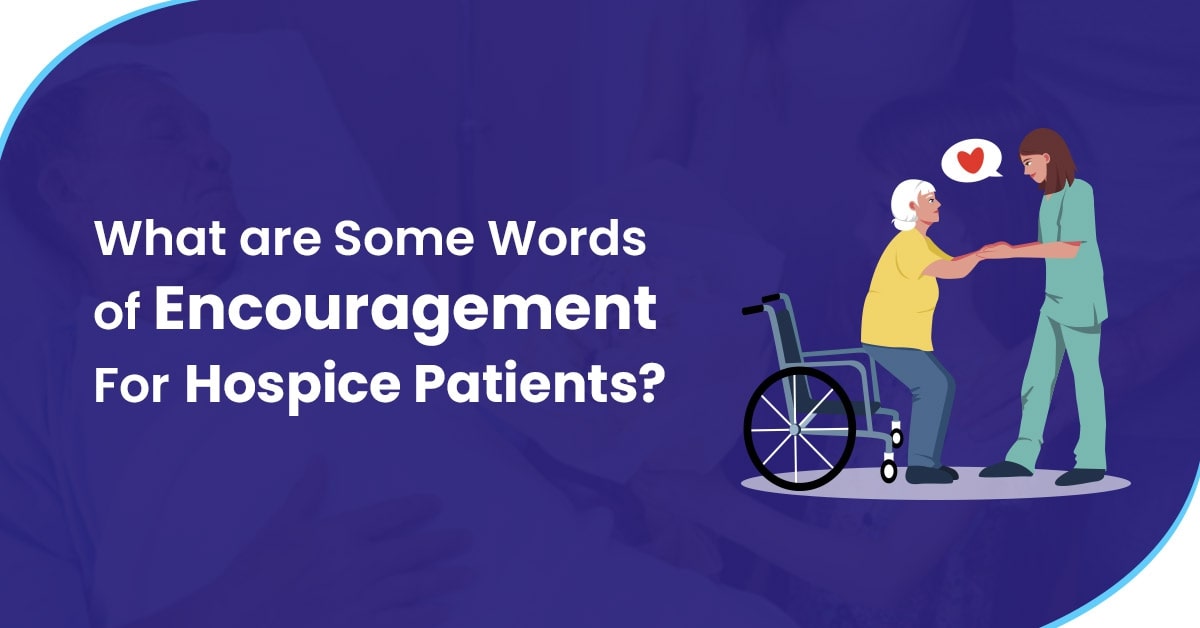You already give medicine, clean sheets, and gentle care.
Yet the most powerful gift you offer may be your voice.
A few words of encouragement for hospice patients can ease fear and bring calm when nothing else will.
Picture a quiet room…
a patient lies there, tired and unsure.
You step in, take a breath, and share simple, steady hope: “I’m here with you.”
In that small moment, pain softens and dignity grows.
These are more than “nice phrases.” They are good words for hospice patients—short, honest lines that remind them they are seen, valued, and never alone.
Why does this matter so much in clinics, hospitals, and hospice houses across the United States?
Because every day you meet people at the edge of life. Drugs ease the body, but encouraging words ease the spirit. They give patients and their families, the strength to face each hour.
Which Uplifting Words Can Bring Comfort to Hospice Patients?
These short, good words for hospice patients do more than fill silence; they give hope, calm nerves, and show respect. When you share them in a clinic, hospital, or home across the United States, you tell every patient, “You matter, right here, right now.”
Use these encouraging words to:
- Ease pain with kindness
- Strengthen the bond between caregiver and patient
- Remind families their loved one is safe and seen
Every phrase is plain-spoken so you can recall it in a rush and speak it with care. One honest sentence, placed at the right moment, can turn fear into peace and make the room feel lighter for everyone.

1). “You are sheltered by love and care.”
That single line may be the most reassuring sentence you speak all day. It tells the person in front of you that they are not facing this stretch of the road alone.
Use gentle, varied language to deepen the message:
- Comforting phrases such as “We’re right here with you” or “Your story matters to us.”
- Supportive messages like “You bring light to this place” or “Your courage guides us.”
- Hopeful words like “I see your strength,” “Your calm inspires your family,” “You are safe.”
- Soothing lines that pair touch with sound: “Let’s breathe together,” “Feel the quiet around you.”
2). “Your courage inspires us all.”
Speak this simple line, and watch a patient’s eyes brighten. Naming their bravery gives them a fresh view of themselves (strong, steady, still in charge of their story).
In hospice rooms and palliative wings all over the United States, such comforting words do real work:
- Honor the fight. You admit the struggle while lifting up the strength it takes to face each day.
- Create trust. A plain, heartfelt compliment turns the care team into true partners, not just staff in scrubs.
- Spread hope. When families hear sincere praise, calm rolls through the hall.
Keep the feeling alive with other supportive phrases you can swap in:
- “Your spirit stays steady, and I admire that.”
- “The way you greet this day teaches all of us.”
- “Your quiet strength guides the people who love you.”
Mix these uplifting remarks, kind sayings, and positive affirmations so your language stays warm and real, never stiff or stuffed with repeats.
3). “May you find peace and comfort today.”
Peace lives in small, real things—soft light on a pillow, the hum of a friend’s voice, the steady hands of a nurse. When you speak this soothing phrase for hospice patients, you guide their mind to the calm that’s already near. In clinics and hospice homes across the United States, such comforting words slow racing thoughts and ease tight breaths. You remind each person that the present moment can still feel warm and safe.
4). “We are available at every step for you.”
Fear often whispers, “I’m on my own.” Your promise silences that fear. These supportive messages tell patients and their families that help is close from dawn to dark. Every aide, nurse, and doctor stands on the same side. This bond builds trust, which is the heart of good end-of-life care. When folks know the team will not leave, worries shrink, and rest comes easier.
5). “You have achieved more than you could ever imagine.”
Pride is powerful medicine. By naming a patient’s wins—kind deeds, strong love, quiet grit—you refill their spirit. These uplifting words honor a life well-lived and leave a spark of joy that lingers. Staff in busy hospital wings can use this gentle affirmation to help someone see their own story in bright colors, not dull tones. It’s a gift that costs nothing yet gives back to everyone who hears it.
6). “Your kindness has left a permanent impression on all of us.”
Tell your patient this truth, then add why it matters. Their gentle acts have lifted nurses, aides, and loved ones alike. Naming that impact gives real comfort. It is one of those comforting words for hospice patients that says, “You will be remembered, always.”
7). “The strength you show every day is special.”
Hard days call for brave hearts, and your patient proves it shift after shift. By pointing out that courage, you hand them a mirror filled with pride. This short, uplifting phrase keeps dignity front and center and reminds families how much resolve lives in the room.
8). “You are surrounded by compassion and grace.”
Pain can make anyone feel exposed. This gentle line paints a blanket of care around body and spirit. Use it when you adjust a blanket or pull a chair closer. Words like compassion and grace are powerful supportive messages that ground the person in safety and respect.
9). “You are always in our thoughts and hearts, even when we are not with you.”
Quiet hours can feel empty, so fill that space with connection. This reassuring statement lets patients know your team’s concern never clocks out. The promise eases loneliness and keeps hope close by.
10). “Your journey is meaningful, and every moment matters.”
Close the conversation by honoring their full life story. Whether the day holds laughter, tears, or long rests, each minute counts. This gentle affirmation places value on the small details and turns the spotlight toward the patient’s unique path.
More time for care.
Less time for coding and claims.
If billing is stealing time from your staff or patients, let us help. Our HME & DME billing service was built for teams like yours—honest, overworked, and ready for real help.
What Words Should Healthcare Providers Avoid When Speaking to Hospice Patients?
Our words can heal or hurt. In a hospice room, tone and choice make all the difference. Below are phrases to skip, why they sting, and gentle options that keep hope and dignity alive. Use this guide in clinics, hospitals, and hospice homes across the United States to keep your language caring, clear, and kind.

| Words to Avoid | Why They Harm | Warm Alternative |
|---|---|---|
| “We can’t do anything else for you.” | Sounds like you are giving up. The patient may feel cast aside. | “We are here for you and focused on comfort and care.” |
| “You are getting closer to the end.” | Harsh, cold, and strips away dignity. | “It’s normal to feel many things right now. We are here with you.” |
| “It’s time to say goodbye.” | Creates fear and rushes the moment. | “You matter to us, and every moment we share is precious.” |
| “You just have to be positive.” | Shuts down real feelings and adds pressure. | “Tell me what feels hard today so we can ease it together.” |
| “Everyone goes through this.” | Dismisses the patient’s unique story. | “Your feelings and your journey are important to us. We’re listening.” |
| “At least you lived a full life.” | Minimizes grief or regrets. | “You are surrounded by love and kindness, right here and now.” |
| “Get stronger for your family.” | Puts extra weight on the patient. | “Your life has already brightened so many others.” |
| “Why are you upset? Be grateful.” | Blames the patient for normal emotions. | “You don’t have to face this alone. We’re with you every step.” |
“We can’t do anything else for you”
“We can’t do anything else for you” can land like a door slamming shut. A patient may hear it as, “You’re on your own now.” Instead, keep the door wide open with a comforting line such as, “We’re here to ease your comfort and stand beside you.” This short, warm promise tells the person that skilled hands and kind hearts remain fully engaged in their care.
“You are getting closer to the end”
“You are getting closer to the end” feels blunt and cold, stripping away dignity. Choose a gentler path—acknowledge emotion without announcing a countdown: “It’s normal to feel many things right now, and we’re here with you.” That calming phrase lets patients share fears or hopes while reminding them they’re not walking alone.
“It’s time to say goodbye”
“It’s time to say goodbye” can spark panic or grief long before the moment is right. Try a more soothing message: “You matter to us, and each moment we share is precious.” This keeps the focus on living the time that’s left, wrapping the patient in respect instead of finality.
“You just have to be positive”
“You just have to be positive” shuts down honest feelings and piles on guilt. Invite real talk with a supportive question: “Tell me what feels heavy today so we can make it lighter together.” By welcoming all emotions, you strengthen trust and give the person space to breathe.
“All have to go through it eventually”
“All have to go through it eventually” flattens a unique story into a blunt statistic. Swap in a heartening remark like, “Your journey is your own, and we value every step of it.” That single, kind sentence validates the patient’s lived life and keeps their individuality front-and-center.
“At least you’ve lived a full life”
“At least you’ve lived a full life” can feel like a brush-off, ignoring current sorrow or unfinished dreams. Offer comfort instead: “You are surrounded by love and kindness right here and now.” These encouraging words shine light on present support rather than judging past milestones.
“You should focus on getting stronger for your family”
This phrase places a heavy burden on someone already tired. Shift the weight with a positive statement: “Your life has already brought so much good to the people you love.” This reminds the patient of their lasting impact without demanding fresh effort.
“Why are you upset? You should be grateful”
“Why are you upset? You should be grateful” scolds rather than soothes. Trade it for a gentle assurance: “You don’t have to face any feeling alone—our team is here for you.” By naming your presence and care, you create safe space for tears, hope, or silence, whichever arrives.
Billing shouldn’t be the hardest part of hospice.
Your team gives everything to patients. We give everything to make sure you get reimbursed properly. If your DME billing is draining time or money, we should talk.
How Can Encouraging Words Lift a Hospice Patient’s Spirit?
Kind speech works like gentle care—quiet but strong. The right sentence can ease pain, clear fear, and remind a person that their life still shines.
Below are eight simple ways U.S. hospice teams can use comforting words, uplifting phrases, soothing statements, and gentle affirmations to brighten each day.

Open every talk with true concern
Begin with a soft check-in: “How are you feeling this morning? Your spirit guides us.” A short, kind greeting sets a safe tone and invites the patient to share. When people feel heard first, trust follows.
Praise the strength you see
Say, “Your courage amazes me,” or “The grit you show each day is remarkable.” Naming their bravery lifts self-esteem and turns hard hours into proof of resolve.
Add calm, spiritual notes when welcome
Some patients lean on faith. Phrases such as “May peace fill this moment” or “Light and hope surround you” offer deep comfort. Always match your words to the person’s own beliefs.
Accept every feeling
Swap “Don’t be sad” for “It’s normal to feel this way, and we’re right beside you.” Validating fear or grief lowers loneliness and builds an honest bond.
Stress that no one walks alone
Remind them, “You’re never on your own; our team is here every step.” Knowing a strong net of care is close cuts worry and brings ease.
Keep the focus on comfort
Say, “Our goal is to make you as comfortable as possible,” or “Let us handle the hard parts so you can rest.” Shifting talk from illness to ease calms the mind and body.
Create small pockets of quiet
During tense moments, use a soft cue: “Take a slow breath—you are deeply cared for.” Short, soothing lines ground the patient and soften stress.
Make each message personal
Link your words to what matters most to them. For the gardener: “The roses outside bloom because of growers like you.” Tailored remarks show you see the whole person, not just the diagnosis.
Ideas for Healthcare Providers to Use Encouraging Words Inspired by These Quotes
When we speak with people in hospice care, every word carries weight. Below are practical ways you and your care team can weave famous quotes into daily visits.
➔ Celebrate the small win
“It always seems impossible until it’s done.” – Nelson Mandela
Hospice days can feel long. Point out each completed task—finishing lunch, sitting up, making a call. Simple good words like “You did it” or “That was a big step” remind the patient that hard moments end, and a new calm follows.
➔ Spark belief in the next step
“Believe you can and you’re halfway there.” – Theodore Roosevelt
Slip this quote into conversation when a patient tries something new, such as guided breathing or a short walk to the window. Follow with short, clear phrases: “I trust you.” “Your effort matters.” Confidence grows, and so does emotional ease.
➔ Reframe struggle as strength
“Strength does not come from winning. Your struggles develop your strengths.” – Arnold Schwarzenegger
After a tough symptom flare-up, speak to the growth you see: “Yesterday was rough, yet you met it with courage.” Acknowledge effort, not just outcome. It turns a hard night into proof of inner power.
➔ Give hardship a greater story
“Hardships often prepare ordinary people for an extraordinary destiny.” – C. S. Lewis
Families sometimes question “Why now?” Share this line, then connect it to legacy: photos, letters, or stories the patient wants to pass on. You honor struggle while guiding them toward meaning.
➔ Boost self-worth during vulnerable hours
“You are braver than you believe, stronger than you seem, and smarter than you think.” – A. A. Milne
Night brings worry. Read this quote aloud at bedtime checks, then add: “Your wisdom helps me care for you better.” The patient feels seen, and fear eases.
➔ Plant the idea of quiet miracles
“Out of difficulties grow miracles.” – Jean de La Bruyère
After pain medication takes hold, note small “miracles”: a deeper breath, a relaxed brow, a laugh between spouses. Naming these moments brings hope back into the room.
➔ Keep light in sight
“Hope is being able to see that there is light despite all of the darkness.” – Desmond Tutu
When a patient talks about fear of the unknown, turn off harsh overhead lights, open curtains, and say: “Let’s look for today’s light together.” Pair the quote with a real glow—morning sun, a candle, or a soft lamp.
➔ Honor the unbreakable spirit
“The human spirit is stronger than anything that can happen to it.” – C. C. Scott
During care-plan reviews, remind both patient and family of strengths already shown—staying kind, sharing jokes, choosing their care goals. These words of encouragement for hospice patients reinforce dignity and control.
How Can Hospice Teams Weave Encouraging Words into Everyday Care?
When you lean over a bedside in a U.S. hospice, the right sentence can feel like a warm hand on the shoulder.
Below are simple, human-sounding ways nurses, aides, social workers, chaplains, and physicians can fold words of encouragement for hospice patients into each shift and keep the conversation honest, hopeful, and kind.

Bedside chats that honor the person
Pull up a chair, meet the patient’s eyes, and speak in short, warm phrases:
- “I see how much strength you show.”
- “Your story matters to me.”
These good words for hospice patients recognize the struggle without glossing over it. Listen more than you talk, and let the next line come from what you hear.
Pocket-size notes and cards
A handwritten card that reads, “You are loved and never alone,” can rest on a nightstand long after you leave. Volunteers, family members, and staff can all add their own uplifting phrases and supportive words, turning fleeting moments into lasting comfort.
Circle-up groups
If patients are able, gather in the garden or day room. Invite them to share favorite inspiring words or brief positive affirmations. Peer-to-peer sharing often feels more genuine than any speech—building a small community of hope inside the clinic or hospital.
Digital touchpoints
Many U.S. hospice units now use tablets or room monitors that display rotating comfort words such as “Your courage shines today.” This low-tech step delivers steady reassuring words every time the screen wakes, even when staff are busy elsewhere.
Family coaching
Loved ones sometimes freeze, unsure what to say at the end of life. Offer a one-page cheat sheet of encouraging words for hospice patients, like:
- “Dad, your laugh still fills the room.”
- “Your love keeps teaching us.”
Giving families the language they crave lets them stay present rather than retreat into silence.
Staff huddles that refill your own word bank
Begin each shift with a 60-second round where team members share a new motivational word or phrase they plan to use that day. This habit keeps language fresh and reminds everyone that the voice is a clinical tool, just like medication or touch.
Your hospice deserves a billing setup that works as hard as you do.
Most providers we talk to are skeptical at first. Then they see how smooth our medical billing service really is. Let’s show you what we mean—book a quick demo.




